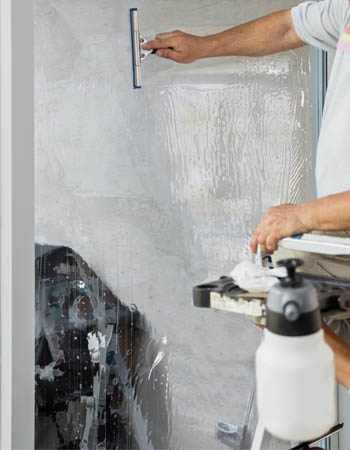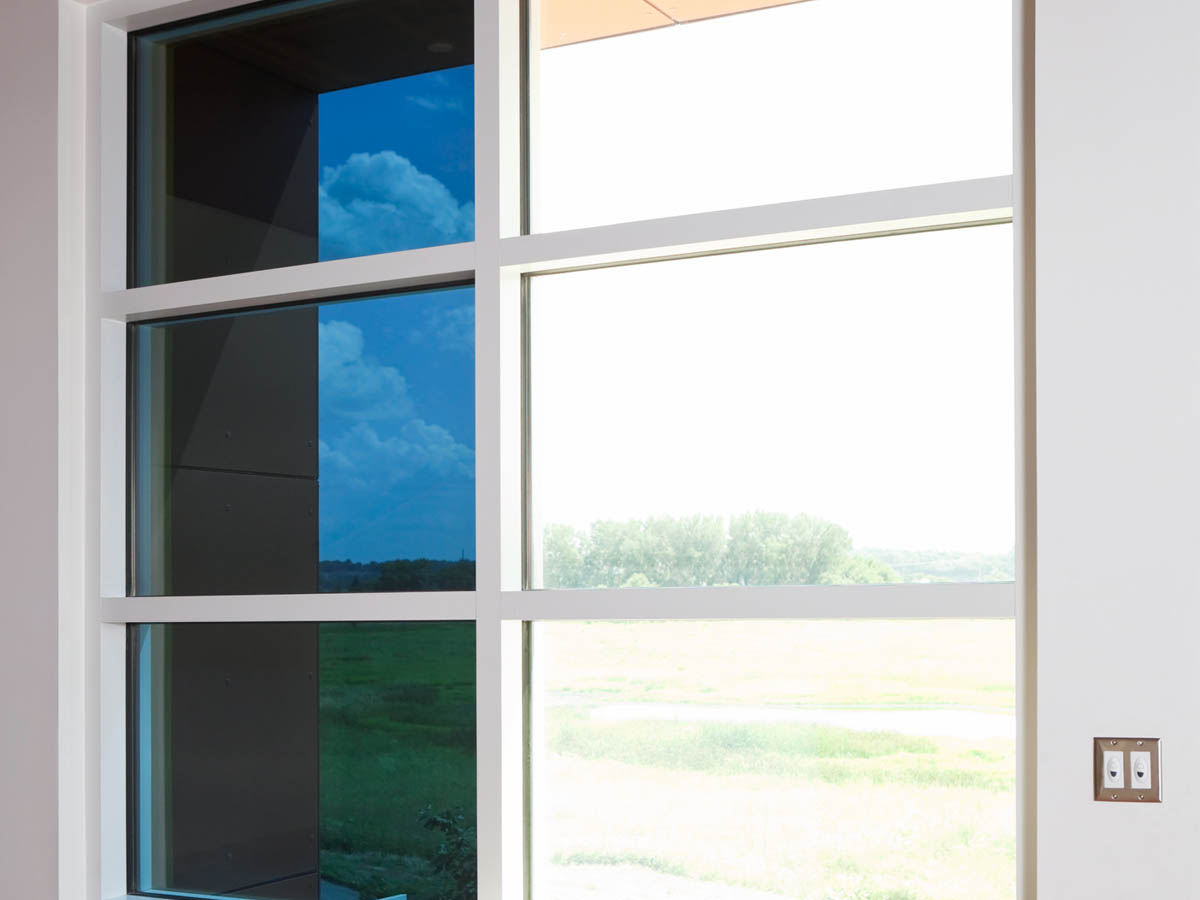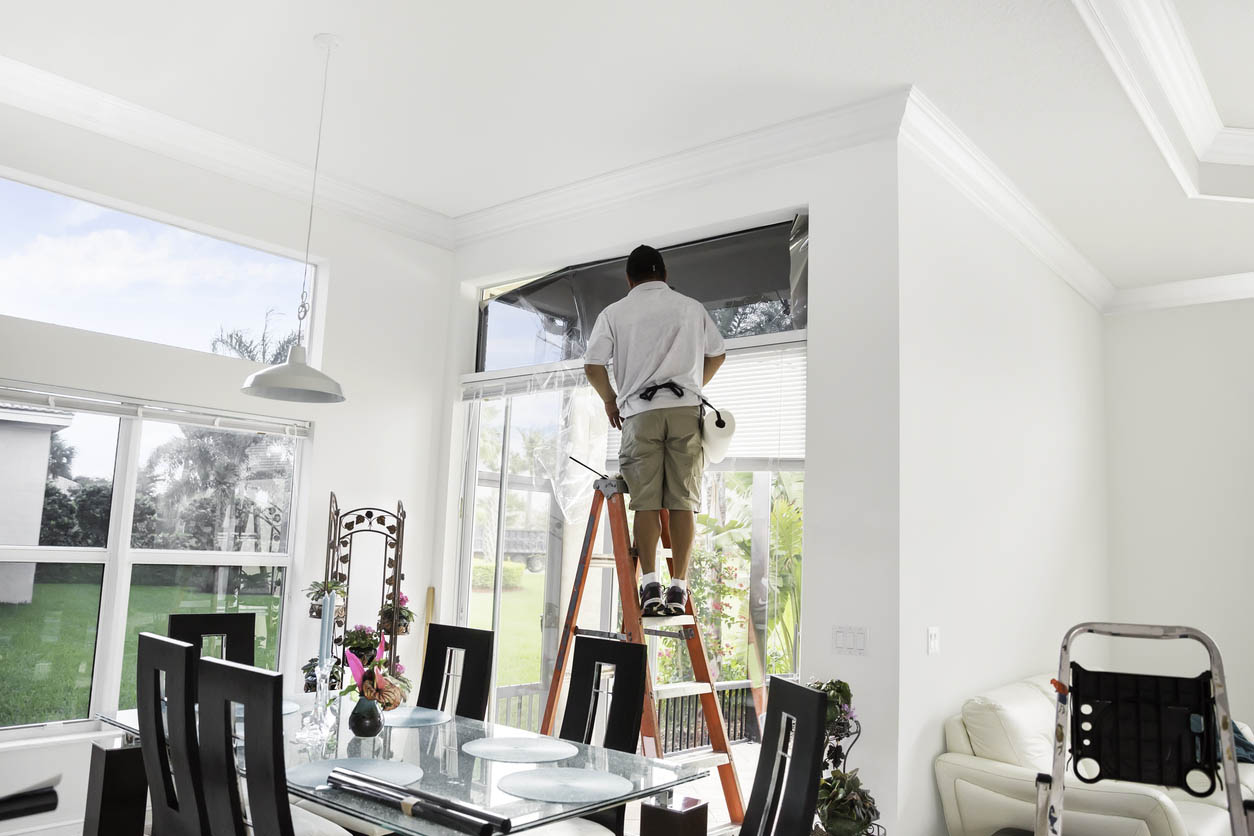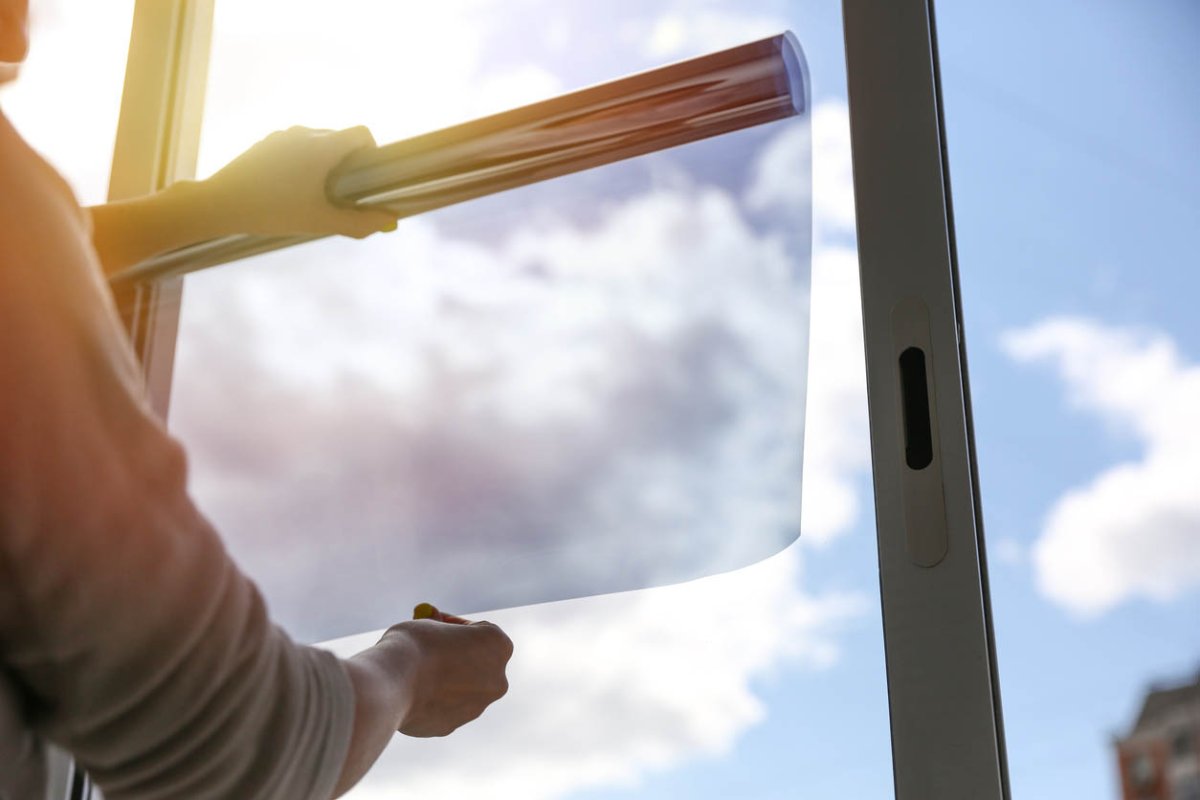We may earn revenue from the products available on this page and participate in affiliate programs. Learn More ›
- Typical Range: $316 to $907
- National Average: $587
Many people are familiar with window tinting for cars but perhaps not as much with home window tinting. Tinting the windows in your home is an excellent way to boost your home’s safety, privacy, and energy efficiency, but how much does window tinting cost? According to HomeAdvisor, the cost of home window tinting ranges from $316 to $907, with the national average around $587. The cost of the film can run between $2 and $100 per square foot, and the price of installation averages $5 to $10 per square foot. Some companies will tint windows in both homes and cars, but it’s always best to ask if they have specific experience with home window tinting as it requires a slightly different skill set. Installing car window tinting can cost between $100 and $200 on average, and some of the more expensive films can cost upward of $500. To find the best prices on car window tinting, search online for “car window tinting near me.” If you’re interested in home window tinting, read on to learn about the costs and considerations.
Factors in Calculating Home Window Tinting

Calculating window tinting cost depends on a few factors. Prices can differ from the national average due to window size, style, and shape; location of the windows; how many windows need to be tinted; film type used; the purpose of the tint; and the cost of labor in your area.
Window Style, Size, and Shape
The window style, size, and shape affect window tinting cost. Flat windows will be easier to treat, so they will be cheaper. Curved windows require more skill and equipment and will be more expensive. Sliding glass doors and large picture or bay windows will be more costly because they need larger pieces of film. On average, the cost to tint two 3-foot by 5-foot windows ranges from $210 to $720 for the film. To find the best home window tinting prices that fit your budget, an online search for “tint shop near me” will help find window tinting companies in your area.
Number and Location of the Windows
Some window tinting companies require a minimum number of windows for a tinting project. The overall cost of window tinting your home can be lowered if you have more windows or more surface area to cover. The tinting price is usually lower if the windows are on the ground level and are easily accessible. Windows on the upper floors will require more equipment.
Film Type and Quality
Window film usually costs between $2 to $14 per square foot, not including installation. The cost depends on the film type and quality. Some window tinting film is superficial and for decorative purposes, and other types are higher quality to save on energy costs.
- Decorative. Decorative window film averages between $6 and $13 per square foot. It can improve privacy and curb appeal. Decorative film is usually used in bathrooms and front doors to allow light to come through while maintaining privacy. These films come in various patterns, colors, designs, shades, and styles. They don’t have UV blocking protection, but they are good for changing up the look of your home. These privacy films can be obscuring or obstructive. Obscuring film allows one-way vision through the window, while obstructive film prevents anyone from seeing in or out of it.
- Metalized. Metalized window film is a good option if you’re looking for privacy and heat regulation. This film has a metallic sheen that also strengthens your windows. Metalized film made of nickel or aluminum deflects heat while keeping the glass cool. Dark and shiny film tints have the best heat reduction performance, while lighter tints typically lose some heat reduction capability.
- Carbon. Carbon window tints prevent sun glare and fading due to UV rays. This matte film blocks heat and light to regulate temperature and lower cooling costs.
- Ceramic. At $5 to $10 per square foot, ceramic window tint is usually the most expensive option. This high-quality film blocks up to 50 percent of UV rays without compromising visibility, and it helps prevent window damage during inclement weather.
Labor
A window tinting installation quote usually includes labor. The national average runs between $5 and $10 per square foot, and labor prices in densely populated urban areas are generally more than in rural areas of the country. Be sure to ask your window tinting professional how they charge for labor.
Spray vs. Window Film
Window tinting spray is sprayed on the surface of the window, so it eliminates the concern for the film bubbling or peeling off. Tinting spray is cheaper than film, but it isn’t as effective for UV damage and heat regulation. Since tinting spray is permanent, the only way to get rid of it is to replace the glass. Tinting spray costs between $5 and $11 per square foot.
Tint Purpose
The most common reasons to tint windows are heat regulation and UV protection. Heat reflective film is transparent and doesn’t change the window’s appearance, while privacy film will restrict viewing in or out of the window. Decorative films provide an extra pop of color or texture, and security film adds a layer of protection against break-ins and inclement weather.

Types of Window Tinting
Window tinting typically costs $2 to $14 per square foot (without installation) and between $50 to $100 per square foot for electrochromic smart glass. Always consult with a window tinting professional to know exactly how much the tinting you want will cost.
3M Window Film
3M window film can cost between $2 to $14 per square foot. 3M offers various films for privacy and to reduce glare, but their security film is designed to keep your home safe by deterring forceful entry and protecting from blasts.
Smart Glass
Smart glass costs around $50 to $100 per square foot, including installation. It blocks light and heat via an app on your smartphone or a home automation system. Smart glass is available as a tint or by installing special smart window glass that works like photochromic eyeglasses. It’s installed in between two glass panels, and it’s available with additional features like fire resistance, double glazing, color, and safety.
Smart Tint
Smart tint typically costs between $30 and $45 per square foot, including installation. Smart tint is a window film that automatically adjusts to heat and light. It will let more light in on overcast days or block more UV rays when it’s sunny and bright. It’s applied in the same way as other types of window tints, and it doesn’t require glass replacement like smart glass installation.
Frosted Glass
Frosted glass film can run between $6 and $10 per square foot. Frosted film is typically applied on bathroom windows where privacy is important. It provides privacy during the day and night while allowing the light to come through. Be advised that it does prevent you from seeing outside.
Ceramic Tint
Ceramic film is usually the most expensive window film. It blocks up to 50 percent of UV rays while maintaining clear visibility. It costs approximately $5 to $10 per square foot. This technology blocks infrared light, deters heat absorption, and prevents glare while letting in the natural light.
Security Film
Expect to pay between $7 and $9 per square foot for security window film. It provides UV and heat protection as well as added protection against window breakage. Some standard security films are:
- Natural disaster film. This film is 3 to 4 millimeters thick, and it prevents damage from earthquakes and hurricanes by keeping shattered glass intact.
- Forced entry film. At 7 to 8 millimeters thick, this film protects against forced entry.
- High-security film. This is the strongest film at 13 to 14 millimeters thick. It takes longer for someone to break through a window coated with a high-security film than other security films.
Solar Window Film
Solar film can cost from $8 to $14 per square foot. It blocks heat by reflecting sunlight without changing the appearance of the window. This energy-efficient film blocks UV rays and heat while reducing glare. Solar window film can also be:
- Reflective. It reduces the amount of light and UV rays that enter the home, but it doesn’t provide privacy at night.
- Mirrored. Mirrored solar film provides a mirrored exterior view while allowing those inside to see outside.
- Dual reflective. On the outside, dual-reflective film has a mirrored exterior that blocks the heat while providing clear visibility for those inside the home.
- Ceramic and nano ceramic. This is a new technology that blocks infrared light while controlling heat.
Types of Windows
The type of window that needs to be tinted affects how much window tinting costs. Installation usually costs between $5 and $10 per square foot and between $2 to $100 per square foot for the film. Large and flat windows typically cost less per square foot due to ease of film application.
Flat Windows
It usually costs between $7 and $110 per square foot to install tinting on large, flat windows. Flat windows are typically the least expensive to tint. On average, the larger the window, the cheaper the cost per square foot for tinting.
Patio or Sunroom Windows
Tinting a 2-foot by 3-foot sunroom window usually costs between $42 and $660. The difference in price range is because of the different types of tints available for blocking UV rays and heat to maintain a steady and comfortable temperature in a patio or sunroom.
Sliding Glass Door
Tinting on sliding glass doors may be more expensive because they require a larger piece of continuous film. Installing a larger piece of tinting film is tricky because it needs to be measured precisely and applied without any fingerprints, creasing, or bubbles.
Door Tint
Applying tint to door windows ranges from $7 to $110 per square foot. Some professionals may charge a flat rate of $100 to $150 per door. Door tints can be merely decorative or provide extra privacy. Always check with your contractor to confirm how the tinting you choose is priced.
Skylights
It’s best to ask a professional if they will tint a skylight and how much it will cost. Some pros will not tint skylights since many window film manufacturers recommend against it, and the film may not adhere well to the plexiglass of a domed skylight. Applying window tinting to a skylight usually requires special materials, so be prepared to pay more for this option.
French or Muntin Windows
Windows with small panes cost around $10 per square foot for installation, plus $2 to $100 for the film. The film for each pane needs to be meticulously and accurately cut, which results in more labor costs.
French Door
French door window film typically costs between $10 and $19 per square foot, including materials and labor. The panes in French doors are usually smaller, and it takes more time to cut the individual pieces of film to fit each pane.
Hurricane Window
Expect to pay between $7 and $15 per square foot, including materials and labor, for hurricane window tinting. Hurricane windows have multiple layers of glass with an interior and exterior pane. They’re impact resistant and excel at stopping wind-borne damage from storms. Adding window tinting to a hurricane window will add extra protection, increase the energy efficiency, and provide a greater sense of privacy.

What Are the Benefits of Home Window Tinting?
Installing window tinting can improve the appearance of your home, enhance indoor comfort, protect your privacy, and increase energy efficiency. Whether you’re looking for purely decorative film or an option to increase your security, there’s a product for you. Here are some benefits of adding window tinting to your home.
Privacy
Privacy window film allows you and your family to have the window blinds or curtains open while preventing anyone from seeing who or what is inside your home. There isn’t any type of window film that will 100 percent protect your privacy without occluding your view from the inside, but with decorative privacy window film, you can protect your privacy without sacrificing aesthetics.
Heat Absorption
Tinting that darkens the window will also absorb heat to keep your home cooler during the warmer months. It reduces glare and will reduce energy costs. It’s important to note that heat-absorbing window tint should only be used on glass that is rated to resist the additional heat.
UV Protection
UVA and UVB rays cause skin damage and increase the risk of skin cancer. By installing ceramic or solar window film, you can protect yourself and your family by blocking harmful UV rays. Many types of window tinting film are rated by thickness. This can impact the amount of heat blocking or UV protection it offers. Window tinting sprays are not as effective in blocking UV rays as traditional window film. Solar and security window film reduces damaging UV rays, while decorative tinting film doesn’t offer that protection.
Home Furnishings Protection
UV rays also cause fading and discoloration in carpeting, rugs, flooring, and furniture. Tinted windows will protect your home from repeated exposure to the sun’s harmful rays.
Glare Prevention
Glare prevents you from seeing your computer monitor, television, or cell phone clearly. Applying window tinting allows you to enjoy the natural light without it reflecting off a screen. Glare prevention is especially important in living rooms, offices, and any area where you regularly use a screen for work or entertainment.
Safety
Security window films enhance the strength and security of the windows. They’re used to prevent break-ins, protect against extreme weather conditions, and safeguard against accidents. Security window film typically prevents the window from shattering to minimize injury.
Energy Efficiency
By blocking UV rays and absorbing heat, tinted window film is energy efficient. It can lessen solar heat gain and reduce cooling costs by as much as 30 percent. Applying tinted window film to older windows will make them more energy efficient so you can save on energy costs. Installing window film will help minimize the time your air conditioning needs to work overtime.
Increased Home Resale Value
Window tinting can increase the value of your home. If you’re looking to put your home on the market, adding decorative, solar, or security window tint may make your home more appealing to potential buyers. [homadvisor]
Lower Maintenance
Tinted windows require less maintenance than non-tinted windows. They break less, and if repairs need to be made, the entire pane of glass can be replaced without the hassle of removing window tinting film. Tinted windows can be easily cleaned, and they show fewer fingerprints and streaks. Avoid vinegar and ammonia-based cleaners since they can damage the film.
DIY vs. Hiring a Professional
It may sound tempting to save $5 to $10 per square foot on installation and apply window tinting yourself, but leaving it to the pros is usually the way to go. Hiring window tinting professionals ensures that the tinting will last longer and the project will take less time. Also, professionals typically offer warranties for their work. Film window tint application involves heating an adhesive to adhere the film to the window correctly. Done incorrectly, it can result in bubbling window tint that is ineffective and unsightly. Professionals have the experience and knowledge to cut the film precisely so it fits the window, remove the backing so the film doesn’t crease, and apply it without leaving fingerprints behind.

How to Save Money on Home Window Tinting Cost
Home window tinting prices can be high, and the additional costs associated with the project can quickly add up. One way to save on window tinting is to do it yourself, but there are other ways to save without compromising quality.
- Limit the number of windows. If you’re looking to block the heat and absorb the sun’s rays, choose windows on the side of your home that allow the most light. If you want some decorative touches to update or increase your home’s curb appeal, pick windows with the most visibility, such as those in the front door or the front of the house.
- Get multiple estimates. Do your research and get at least three estimates from window tinting professionals.
- Pick the film wisely. You may be able to get some window film installed for around $7 per square foot. Some of the higher-end films can cost upward of $100 per square foot. If you’re looking to save money while enjoying the benefits of window tinting, look for the less expensive options.
- Look for discounts. Some window tinting companies may offer discounts based on the number of windows, doors, or total square footage that will be tinted.
- Avoid the odd-shaped windows. Unusually shaped windows typically cost more to tint than standard-size windows because of the extra time and effort needed for application.
Questions to Ask About Home Window Tinting Cost
Asking a professional the right questions about home window tinting cost can minimize miscommunication, save money, and get the desired results. Here are some questions to ask window tinting installation professionals.
- Is your business insured and bonded?
- Do you have references?
- Do you offer a warranty on product and labor?
- Can I get a free estimate?
- Who will be installing the window tint in my home?
- How long will the project take?
- How long will the tinting last?
- What types of tints do you offer?
- What do I do after installation?
- Do you have maintenance and care recommendations?
FAQs
Deciding on the right window tinting for your home while staying within your budget can be a daunting process. Here are some frequently asked questions about window tinting costs to help guide you in your decisions.
Q. Is it hard to remove a tint from a window?
Removing window tint can be difficult, and many homeowners decide that calling in a professional is the best option.
Q. How much window tint do I need?
Window tints are rated by how thick they are, which affects the amount of protection they provide, whether it’s UV protection or heat blocking. A professional will determine how much window tint you need for your home based on the purpose of the tinting.
Q. How long do tinted windows last?
Correctly installed tinted window film typically lasts between 5 and 30 years, depending on the film type and location.
Sources: HomeAdvisor, Thumbtack, HomeGuide, Fixr


